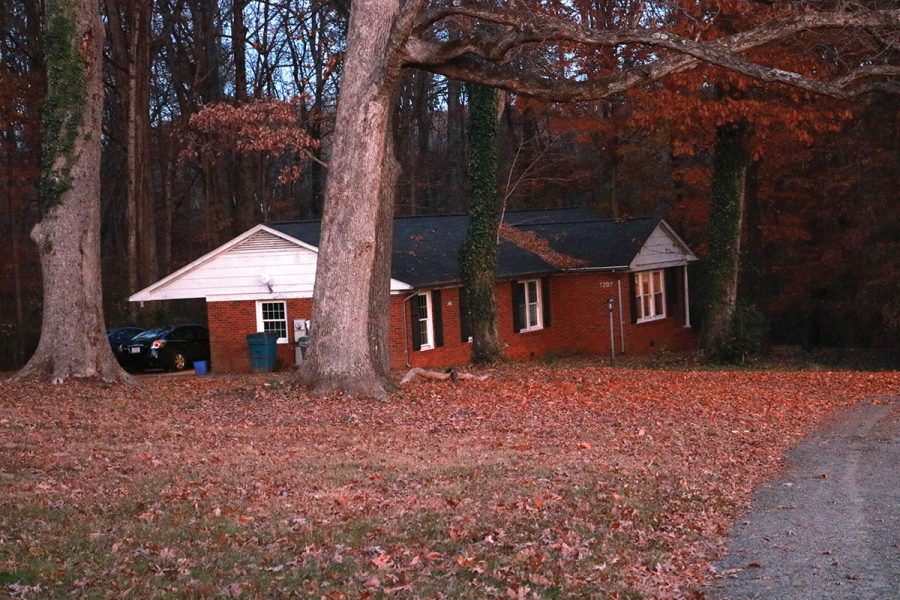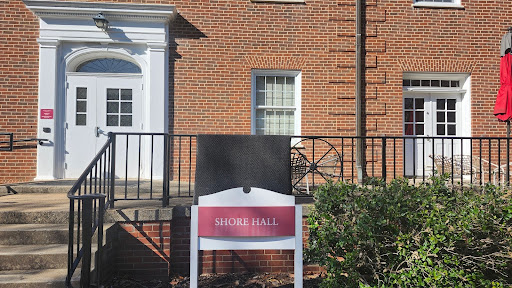Students see change from theme housing to themed living communities
Students from The Pines will be adapting the sustainability theme into cooperative living situation in the north apartments next year.//Photo by Abigail Bekele/The Guilfordian
Last semester, it was announced that Guilford’s longtime tradition of theme houses would be coming to an end. Administration has cited health and safety regulations as well as the inadequate funds to renovate the houses as the reasons The Pines, Cobb House and Pope House must permanently close their doors to students beginning Fall 2019. As of right now, administration has no plans on what to do with the structures themselves, but they will be put under the control of business and finance department.
Renovations of the houses, including the addition of sprinkler systems, would equal approximately $600,000. In a GSBA meeting on Feb. 25, Dean of Students Steve Mencarini stated that the decision was made following a the compilation of a comprehensive list of safety issues found in the theme houses, as well as the board of trustees’ desire to implement sprinklers in all campus housing.
But this will not be the last time students see themed living on campus. Beginning next semester, the Department of Residential Education & Housing will introduce several new initiatives to create themed living communities (TLCs) on campus. Each building of the South Apartments (the News) will be designated as a TLC; service, social justice and sustainability, respectively. In the Feb. 25 GSBA meeting, Housing Operations Coordinator Ja’Lessa Morris discussed plans for living communities housed in residence halls and dormitories. Shore Hall is to be a specialized hall for communal queer living, Mary Hobbs Hall will be readopting its previous women’s empowerment “EMPOWER” living learning community designation and English Hall will be adapted into a Global Learning & Academic Wellness themed community, designed for the dual purpose of hosting international students and fostering an academic environment not exclusive to honors students. Tentatively, Binford and Milner will have allotted areas for first-year students interested in cultivating leadership skills.
“We tried to think about themed living and how we could be more intentional about community so we talked about what are some things that Guilford already sees, and what students connected to in the past,” Morris said.
Moreover, Mencarini explained that students currently living in theme houses will be given the opportunity to continue living together and “transition their living situation” into different housing.
“If they wanted to take a floor in the north campus or south campus apartments, or live next door to each other in English, we will work with them to make that happen,” Mencarini said.
Guilford may be making new efforts to create themed living communities, but many students are not pleased. The decision to eliminate theme houses and replace them with themed living communities came less than a semester after the student-run Greenleaf Coffee Co-op lost its space on campus, now being informally replaced by Rachel’s Rose Cottage, a non-student operated coffee shop. Places that were known for being student-oriented and radical are being replaced by spaces operated by administration and dining service Meriwether Godsey.
“I think the theme houses became places where people became radical and authentically themselves,” said junior Ten Henson, a resident of Cobb House. “It became a place where students were upholding ideals that the administration did not want to fight us on. We would call them out for enforcing capitalism and having racist, sexist and transphobic policies. I think administration was intimidated.”
Cobb House is a space for women and non-binary students of color. Henson believes that the spirit and community of theme houses cannot be replicated in the new themed living, particularly the social justice, sustainability and service-themed apartments.
“Cobb members are busy people. We’re involved, we’re invested,” Henson said. “We’ve all been involved with organizing in the past and trying to uphold morals of students and especially administration. Saying that all we did is social justice is not true. I’d say I live in Cobb because I want to focus on community and intentionality and mindfulness. It feels like another kick in the face. They aren’t acknowledging the work and purpose of what (Cobb) was. ”
In the wake of having Cobb House close its doors for students, Henson and one of their Cobb housemates have made the decision to move off-campus next year.
“I don’t want to live here if I can’t live in Cobb. It is my home,” Henson said. “It’s unfair that my house is being taken from me. That’s not ethical at all. It’s dissociating and bad for mental health. We have roots somewhere, and now we’re being told we can’t tend to those roots, so we won’t be partaking in the themed living at all.”
While the members of Cobb House will not be returning for on-campus themed living, students from The Pines will be developing a cooperative living situation in the North Apartments (the Olds). Pines resident junior Addie Ronis sees the new location in the Olds as being a more approachable living situation for those who may have previously seen theme houses as being too much of a commitment.
“We took this as an opportunity to make a new intentional living community like theme housing where there are values of sustainability and social justice,” Ronis said. “It’s supposed to be experimental cooperative housing. We want to have a focus on the Guilford community being involved in it regardless of whether or not they live there.
I think we’re envisioning that this new co-op will have a focus on bringing people who live there and people who don’t live there into the mix. A lot of it is going to be shaped by the people who are there.”
Ronis is hopeful about the co-op’s future, but maintains some reservations.
“I’m feeling quite positive about it, and I hope other people are too,” Ronis said. “I’m a bit worried about the administrative side. Because they’re making these theme apartments and intentional living communities, (the co-op) is being brushed under the rug as an option.”
Henson also would like to see the themed living succeed, but asserts that the change must be contingent upon administration, and not student work.
“The dreamer in me would love to see Guilford administration understand how to do this correctly,” Henson said. “But I think the reality is that it isn’t going to be what people need.”
For Henson, Cobb was a place of calmness and support.
“I’m going to miss living in the woods and my immediate access to quiet. As a queer person of color, the world is super loud for me sometimes. Being able to have a respite on campus was really great,” Henson said. “I’m going to miss coming home to my friends all the time. We would be in true community. When one person was upset, the whole house would help.”
Where some students may reminisce over the eerie hallways and first-year antics of Milner, the village-like atmosphere of the Olds or Mary Hobbs’ elegant interior, those who have lived in theme houses discuss their living space like one would a home.
“Having a physical house has all these interesting familial connotations, and it’s really manifested in the people that live there,” Ronis said. “We interact like we are a family. We’re cooking each other food, and doing chores. It’s an interesting and specific situation that not a lot of people have experienced, unfortunately.”









